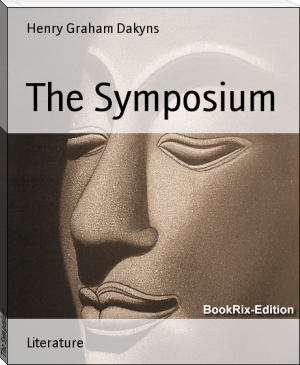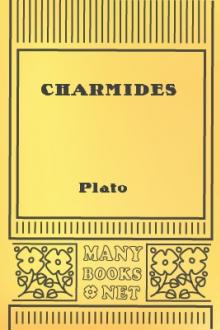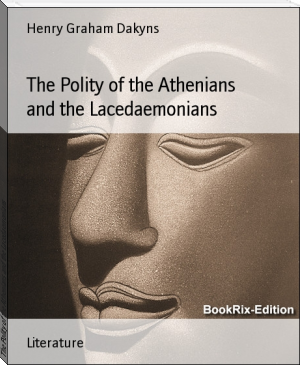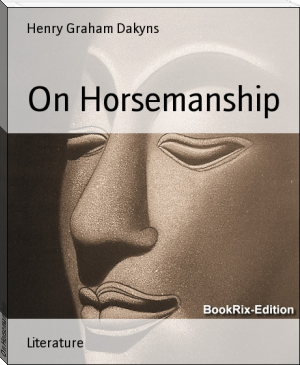The Symposium - Henry Graham Dakyns (popular ebook readers .TXT) 📗

- Author: Henry Graham Dakyns
Book online «The Symposium - Henry Graham Dakyns (popular ebook readers .TXT) 📗». Author Henry Graham Dakyns
of surfeit is engendered. Just as the eater's appetite palls through repletion with regard to meats, (28) so will the feelings of a lover towards his idol. But the soul's attachment, owing to its purity, knows no satiety. (29) Yet not therefore, as a man might fondly deem, has it less of the character of loveliness. (30) But very clearly herein is our prayer fulfilled, in which we beg the goddess to grant us words and deeds that bear the impress of her own true loveliness. (31)
(28) Cf. "Mem." III. xi. 13.
(29) Lit. "is more insatiate." Cf. Charles Wesley's hymn:
O Love Divine, how sweet Thou art! When shall I find my willing heart All taken up by Thee?
(30) Lit. "is she, the soul, more separate from Aphrodite."
(31) Or, "stamped with the image of Aphrodite." Zeune cf. Lucr. i. 24,
addressing Venus, "te sociam studeo scribendis versibus esse," "I
would have thee for a helpmate in writing the verses..."; and
below, 28, "quo magis aeternum da dictis, diva, leporem,"
"Wherefore all the more, O lady, lend my lays an ever-living
charm" (H. A. J. Munro).
That a soul whose bloom is visible alike in beauty of external form, free and unfettered, and an inner disposition, bashful, generous; a spirit (32) at once imperial and affable, (33) born to rule among its fellows--that such a being will, of course, admire and fondly cling to his beloved, is a thesis which needs no further argument on my part. Rather I will essay to teach you, how it is natural that this same type of lover should in turn be loved by his soul's idol. (34)
(32) Cf. Plat. "Phaedr." 252 E.
(33) The epithet {philophron} occurs "Mem." III. i. 6, of a general;
ib. III. v. 3 (according to the vulg. reading), of the Athenians.
(34) Or, "the boy whom he cherishes."
How, in the first place, is it possible for him to hate a lover who, he knows, regards him as both beautiful and good? (35) and, in the next place, one who, it is clear, is far more anxious to promote the fair estate of him he loves (36) than to indulge his selfish joys? and above all, when he has faith and trust that neither dereliction, (37) nor loss of beauty through sickness, nor aught else, will diminish their affection.
(35) Or, "perfection."
(36) Lit. "the boy."
(37) Reading {en para ti poiese}. Al. "come what come may," lit. "no
alteration"; or if reading {parebese} transl. "although his May of
youth should pass, and sickness should mar his features, the tie
of friendship will not be weakened."
If, then, they own a mutual devotion, (38) how can it but be, they will take delight in gazing each into the other's eyes, hold kindly converse, trust and be trusted, have forethought for each other, in success rejoice together, in misfortune share their troubles; and so long as health endures make merry cheer, day in day out; or if either of them should fall on sickness, then will their intercourse be yet more constant; and if they cared for one another face to face, much more will they care when parted. (39) Are not all these the outward tokens of true loveliness? (40) In the exercise of such sweet offices, at any rate, they show their passion for holy friendship's state, and prove its bliss, continuously pacing life's path from youth to eld.
(38) For beauty of style (in the original) Zeune cf. "Mem." II. vi. 28
foll.; III. xi. 10.
(39) "Albeit absent from one another in the body, they are more
present in the soul." Cf. Virg. "Aen." iv. 83, "illum absens
absentem auditque videtque."
(40) Or, "bear the stamp of Aphrodite."
But the lover who depends upon the body, (41) what of him? First, why should love-for-love be given to such a lover? because, forsooth, he bestows upon himself what he desires, and upon his minion things of dire reproach? or that what he hastens to exact, infallibly must separate that other from his nearest friends?
(41) Or, "is wholly taken up with." Cf. Plat. "Laws," 831 C.
If it be pleaded that persuasion is his instrument, not violence; is that no reason rather for a deeper loathing? since he who uses violence (42) at any rate declares himself in his true colours as a villain, while the tempter corrupts the soul of him who yields to his persuasions.
(42) Cf. "Hiero," iii. 3; "Cyrop." III. i. 39.
Ay, and how should he who traffics with his beauty love the purchaser, any more than he who keeps a stall in the market-place and vends to the highest bidder? Love springs not up, I trow, because the one is in his prime, and the other's bloom is withered, because fair is mated with what is not fair, and hot lips are pressed to cold. Between man and woman it is different. There the wife at any rate shares with her husband in their nuptial joys; but here conversely, the one is sober and with unimpassioned eye regards his fellow, who is drunken with the wine of passion. (43)
(43) Lit. "by Aphrodite." Cf. Plat. "Phaedr." 240, "But the lover
... when he is drunk" (Jowett); "Symp." 214 C.
Wherefore it is no marvel if, beholding, there springs up in his breast the bitterest contempt and scorn for such a lover. Search and you shall find that nothing harsh was ever yet engendered by attachment based on moral qualities; whilst shameless intercourse, time out of mind, has been the source of countless hateful and unhallowed deeds. (44)
(44) Zeune cf. Ael. "V. H." viii. 9, re Archelaus king of Macedon,
concerning whom Aristotle, "Pol." v. 10. 1311 B: "Many
conspiracies have originated in shameful attempts made by
sovereigns on the persons of their subjects. Such was the attack
of Crataeus upon Archelaus," etc. (Jowett).
I have next to show that the society of him whose love is of the body, not the soul, is in itself illiberal. The true educator who trains another in the path of virtue, who will teach us excellence, whether of speech or conduct, (45) may well be honoured, even as Cheiron and Phoenix (46) were honoured by Achilles. But what can he expect, who stretches forth an eager hand to clutch the body, save to be treated (47) as a beggar? That is his character; for ever cringing and petitioning a kiss, or some other soft caress, (48) this sorry suitor dogs his victims.
(45) Phoenix addresses Achilles, "Il." ix. 443:
{muthon te reter' emenai, prektera te ergon}
Therefore sent he (Peleus) me to thee to teach thee all things, To be both a speaker of words and a doer of deeds (W. Leaf).
(46) See "Il." xi. 831; "Hunting," ch. i., as to Cheiron and his
scholars, the last of whom is Achilles.
(47) {an periepoito}. "He will be scurvily treated." Cf. "Hell." III.
i. 19.
(48) Cf. "Mem." I. ii. 29.
If my language has a touch of turbulence, (49) do not marvel: partly the wine exalts me; partly that love which ever dwells within my heart of hearts now pricks me forward to use great boldness of speech (50) against his base antagonist. Why, yes indeed, it seems to me that he who fixes his mind on outward beauty is like a man who has taken a farm on a short lease. He shows no anxiety to improve its value; his sole object being to take off it the largest crops he can himself. But he whose heart is set on loyal friendship resembles rather a man who has a farmstead of his own. At any rate, he scours the wide world to find what may enhance the value of his soul's delight. (51)
(49) Or, "wantonness"; and for the apology see Plat. "Phaedr." 238: "I
appear to be in a divine fury, for already I am getting into
dithyrambics" (Jowett).
(50) Lit. "to speak openly against that other sort of love which is
its rival."
(51) Cf. Michelet, I think, as to the French peasant-farmer regarding
his property as "sa femme."
Again, let us consider the effect upon the object of attachment. Let him but know his beauty is a bond sufficient to enthrall his lover, (52) and what wonder if he be careless of all else and play the wanton. Let him discover, on the contrary, that if he would retain his dear affection he must himself be truly good and beautiful, and it is only natural he should become more studious of virtue. But the greatest blessing which descends on one beset with eager longing to convert the idol of his soul into a good man and true friend is this: necessity is laid upon himself to practise virtue; since how can he hope to make his comrade good, if he himself works wickedness? Is it conceivable that the example he himself presents of what is shameless and incontinent, (53) will serve to make the beloved one temperate and modest?
(52) Or, "that by largess of beauty he can enthrall his lover."
(53) See Plat. "Symp." 182 A, 192 A.
I have a longing, Callias, by mythic argument (54) to show you that not men only, but gods and heroes, set greater store by friendship of the soul than bodily enjoyment. Thus those fair women (55) whom Zeus, enamoured of their outward beauty, wedded, he permitted mortal to remain; but those heroes whose souls he held in admiration, these he raised to immortality. Of whom are Heracles and the Dioscuri, and there are others also named. (56) As I maintain, it was not for his body's sake, but for his soul's, that Ganymede (57) was translated to Olympus, as the story goes, by Zeus. And to this his very name bears witness, for is it not written in Homer?
And he gladdens ({ganutai}) to hear his voice. (58)
This the poet says, meaning "he is pleased to listen to his words."
(54) Or, "I have a desire to romance a little," "for your benefit to
explain by legendary lore." Cf. Isocr. 120 C; Plat. "Rep." 392 B.
(55) e.g. Leda, Danae, Europa, Alcmena, Electra, Latona, Laodamia
(Zeune).
(56) See "Hunting," i.; "Hell." VI. iii. 6.
(57) See Plat. "Phaedr." 255 C; Cic. "Tusc." i. 26, "nec Homerum audio
... divina mallem ad nos," a protest against anthropomorphism in
religion.
(58) Not in "our" version of Homer, but cf. "Il." xx. 405, {ganutai de
te tois 'Enosikhthon}; "Il." xiii. 493, {ganutai d' ara te phrena
poimen}.
And again, in another passage he says:
Knowing deep devices ({medea}) in his mind, (59)
which is as much as to say, "knowing wise counsels in his mind." Ganymede, therefore, bears a name compounded of the two words, "joy" and "counsel," and is honoured among the gods, not
(28) Cf. "Mem." III. xi. 13.
(29) Lit. "is more insatiate." Cf. Charles Wesley's hymn:
O Love Divine, how sweet Thou art! When shall I find my willing heart All taken up by Thee?
(30) Lit. "is she, the soul, more separate from Aphrodite."
(31) Or, "stamped with the image of Aphrodite." Zeune cf. Lucr. i. 24,
addressing Venus, "te sociam studeo scribendis versibus esse," "I
would have thee for a helpmate in writing the verses..."; and
below, 28, "quo magis aeternum da dictis, diva, leporem,"
"Wherefore all the more, O lady, lend my lays an ever-living
charm" (H. A. J. Munro).
That a soul whose bloom is visible alike in beauty of external form, free and unfettered, and an inner disposition, bashful, generous; a spirit (32) at once imperial and affable, (33) born to rule among its fellows--that such a being will, of course, admire and fondly cling to his beloved, is a thesis which needs no further argument on my part. Rather I will essay to teach you, how it is natural that this same type of lover should in turn be loved by his soul's idol. (34)
(32) Cf. Plat. "Phaedr." 252 E.
(33) The epithet {philophron} occurs "Mem." III. i. 6, of a general;
ib. III. v. 3 (according to the vulg. reading), of the Athenians.
(34) Or, "the boy whom he cherishes."
How, in the first place, is it possible for him to hate a lover who, he knows, regards him as both beautiful and good? (35) and, in the next place, one who, it is clear, is far more anxious to promote the fair estate of him he loves (36) than to indulge his selfish joys? and above all, when he has faith and trust that neither dereliction, (37) nor loss of beauty through sickness, nor aught else, will diminish their affection.
(35) Or, "perfection."
(36) Lit. "the boy."
(37) Reading {en para ti poiese}. Al. "come what come may," lit. "no
alteration"; or if reading {parebese} transl. "although his May of
youth should pass, and sickness should mar his features, the tie
of friendship will not be weakened."
If, then, they own a mutual devotion, (38) how can it but be, they will take delight in gazing each into the other's eyes, hold kindly converse, trust and be trusted, have forethought for each other, in success rejoice together, in misfortune share their troubles; and so long as health endures make merry cheer, day in day out; or if either of them should fall on sickness, then will their intercourse be yet more constant; and if they cared for one another face to face, much more will they care when parted. (39) Are not all these the outward tokens of true loveliness? (40) In the exercise of such sweet offices, at any rate, they show their passion for holy friendship's state, and prove its bliss, continuously pacing life's path from youth to eld.
(38) For beauty of style (in the original) Zeune cf. "Mem." II. vi. 28
foll.; III. xi. 10.
(39) "Albeit absent from one another in the body, they are more
present in the soul." Cf. Virg. "Aen." iv. 83, "illum absens
absentem auditque videtque."
(40) Or, "bear the stamp of Aphrodite."
But the lover who depends upon the body, (41) what of him? First, why should love-for-love be given to such a lover? because, forsooth, he bestows upon himself what he desires, and upon his minion things of dire reproach? or that what he hastens to exact, infallibly must separate that other from his nearest friends?
(41) Or, "is wholly taken up with." Cf. Plat. "Laws," 831 C.
If it be pleaded that persuasion is his instrument, not violence; is that no reason rather for a deeper loathing? since he who uses violence (42) at any rate declares himself in his true colours as a villain, while the tempter corrupts the soul of him who yields to his persuasions.
(42) Cf. "Hiero," iii. 3; "Cyrop." III. i. 39.
Ay, and how should he who traffics with his beauty love the purchaser, any more than he who keeps a stall in the market-place and vends to the highest bidder? Love springs not up, I trow, because the one is in his prime, and the other's bloom is withered, because fair is mated with what is not fair, and hot lips are pressed to cold. Between man and woman it is different. There the wife at any rate shares with her husband in their nuptial joys; but here conversely, the one is sober and with unimpassioned eye regards his fellow, who is drunken with the wine of passion. (43)
(43) Lit. "by Aphrodite." Cf. Plat. "Phaedr." 240, "But the lover
... when he is drunk" (Jowett); "Symp." 214 C.
Wherefore it is no marvel if, beholding, there springs up in his breast the bitterest contempt and scorn for such a lover. Search and you shall find that nothing harsh was ever yet engendered by attachment based on moral qualities; whilst shameless intercourse, time out of mind, has been the source of countless hateful and unhallowed deeds. (44)
(44) Zeune cf. Ael. "V. H." viii. 9, re Archelaus king of Macedon,
concerning whom Aristotle, "Pol." v. 10. 1311 B: "Many
conspiracies have originated in shameful attempts made by
sovereigns on the persons of their subjects. Such was the attack
of Crataeus upon Archelaus," etc. (Jowett).
I have next to show that the society of him whose love is of the body, not the soul, is in itself illiberal. The true educator who trains another in the path of virtue, who will teach us excellence, whether of speech or conduct, (45) may well be honoured, even as Cheiron and Phoenix (46) were honoured by Achilles. But what can he expect, who stretches forth an eager hand to clutch the body, save to be treated (47) as a beggar? That is his character; for ever cringing and petitioning a kiss, or some other soft caress, (48) this sorry suitor dogs his victims.
(45) Phoenix addresses Achilles, "Il." ix. 443:
{muthon te reter' emenai, prektera te ergon}
Therefore sent he (Peleus) me to thee to teach thee all things, To be both a speaker of words and a doer of deeds (W. Leaf).
(46) See "Il." xi. 831; "Hunting," ch. i., as to Cheiron and his
scholars, the last of whom is Achilles.
(47) {an periepoito}. "He will be scurvily treated." Cf. "Hell." III.
i. 19.
(48) Cf. "Mem." I. ii. 29.
If my language has a touch of turbulence, (49) do not marvel: partly the wine exalts me; partly that love which ever dwells within my heart of hearts now pricks me forward to use great boldness of speech (50) against his base antagonist. Why, yes indeed, it seems to me that he who fixes his mind on outward beauty is like a man who has taken a farm on a short lease. He shows no anxiety to improve its value; his sole object being to take off it the largest crops he can himself. But he whose heart is set on loyal friendship resembles rather a man who has a farmstead of his own. At any rate, he scours the wide world to find what may enhance the value of his soul's delight. (51)
(49) Or, "wantonness"; and for the apology see Plat. "Phaedr." 238: "I
appear to be in a divine fury, for already I am getting into
dithyrambics" (Jowett).
(50) Lit. "to speak openly against that other sort of love which is
its rival."
(51) Cf. Michelet, I think, as to the French peasant-farmer regarding
his property as "sa femme."
Again, let us consider the effect upon the object of attachment. Let him but know his beauty is a bond sufficient to enthrall his lover, (52) and what wonder if he be careless of all else and play the wanton. Let him discover, on the contrary, that if he would retain his dear affection he must himself be truly good and beautiful, and it is only natural he should become more studious of virtue. But the greatest blessing which descends on one beset with eager longing to convert the idol of his soul into a good man and true friend is this: necessity is laid upon himself to practise virtue; since how can he hope to make his comrade good, if he himself works wickedness? Is it conceivable that the example he himself presents of what is shameless and incontinent, (53) will serve to make the beloved one temperate and modest?
(52) Or, "that by largess of beauty he can enthrall his lover."
(53) See Plat. "Symp." 182 A, 192 A.
I have a longing, Callias, by mythic argument (54) to show you that not men only, but gods and heroes, set greater store by friendship of the soul than bodily enjoyment. Thus those fair women (55) whom Zeus, enamoured of their outward beauty, wedded, he permitted mortal to remain; but those heroes whose souls he held in admiration, these he raised to immortality. Of whom are Heracles and the Dioscuri, and there are others also named. (56) As I maintain, it was not for his body's sake, but for his soul's, that Ganymede (57) was translated to Olympus, as the story goes, by Zeus. And to this his very name bears witness, for is it not written in Homer?
And he gladdens ({ganutai}) to hear his voice. (58)
This the poet says, meaning "he is pleased to listen to his words."
(54) Or, "I have a desire to romance a little," "for your benefit to
explain by legendary lore." Cf. Isocr. 120 C; Plat. "Rep." 392 B.
(55) e.g. Leda, Danae, Europa, Alcmena, Electra, Latona, Laodamia
(Zeune).
(56) See "Hunting," i.; "Hell." VI. iii. 6.
(57) See Plat. "Phaedr." 255 C; Cic. "Tusc." i. 26, "nec Homerum audio
... divina mallem ad nos," a protest against anthropomorphism in
religion.
(58) Not in "our" version of Homer, but cf. "Il." xx. 405, {ganutai de
te tois 'Enosikhthon}; "Il." xiii. 493, {ganutai d' ara te phrena
poimen}.
And again, in another passage he says:
Knowing deep devices ({medea}) in his mind, (59)
which is as much as to say, "knowing wise counsels in his mind." Ganymede, therefore, bears a name compounded of the two words, "joy" and "counsel," and is honoured among the gods, not
Free e-book «The Symposium - Henry Graham Dakyns (popular ebook readers .TXT) 📗» - read online now
Similar e-books:





Comments (0)